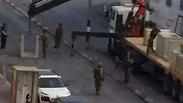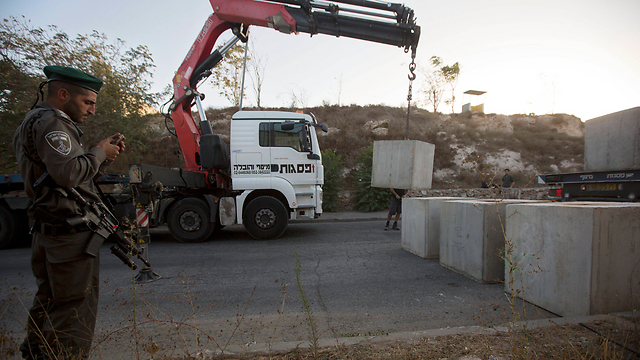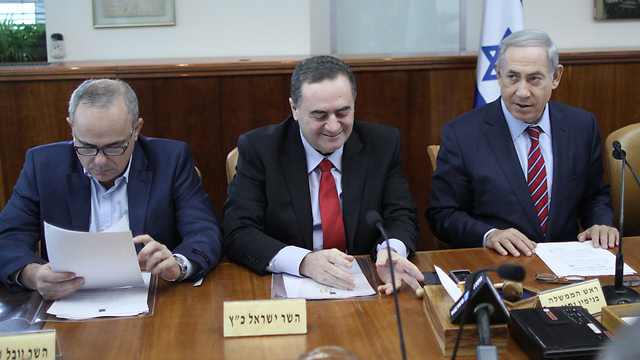
A concrete wall being set up in East Jerusalem.
Prime Minster Benjamin Netanyahu recently raised the possibility of canceling the residency status of the 80,000 Palestinians living in East Jerusalem neighborhoods on the other side of the separation wall. Shuafat refugee camp and Kafr Aqab would be among the affected neighborhoods.
Netanyahu brought up the need to address the situation in East Jerusalem's neighborhoods beyond the wall during a cabinet meeting that took place two weeks ago.

Construction of a concrete wall between Jerusalem neighborhoods of Armon Hanatziv and Jabal Mukaber. (Photo: AP)
"There is no enforcement there, no law," Netanyahu said. "We need to examine the possibility of canceling their residency. There needs to be a discussion about it."
The prime minister also raised the need to examine how law enforcement and security can be improved in these neighborhoods through the deployment of extra police and army units.
The neighborhoods in question are within Jerusalem's municipal boundaries but lie outside the wall and are considered extremely problematic from a security perspective.
However, since there has been no further discussion of the issue it is not yet certain whether this is a serious plan.
Netanyahu's proposal drew responses from a number of ministers, who were surprised to hear him talk of disengagement.
MK Israel Katz had originally raised the topic of the neighborhoods beyond the wall, saying that the area had been abandoned. In response, Netanyahu suggested the possibility of preventing entry to the rest of Jerusalem from those areas.
"That is a far-reaching decision which requires a referendum, because it would involve giving up territory," Katz remarked in response to Netanyahu.
Other lawmakers taking part in the discussion said that the matter affected residents with blue identity cards and that they could not simply be cut off on a whim.
It was subsequently agreed that a special session would be convened to discuss the fate of the neighborhoods beyond the wall.
"Netanyahu spoke about a situation which he seems not to fully understand," a minister said after the cabinet meeting. "We are talking about an unequivocal division of Jerusalem."
"All of Netanyahu's lies have been exposed," said MK Yoel Hasson of the Zionist Union. "After throwing the periphery into the gutter, Netanyahu decided to break another one of his election promises.

Benjamin Netanyahu and Israel Katz in the weekly cabinet meeting. (Photo: Alex Kolomoisky, Yedioth Ahronoth)
"There will no longer be a united Jerusalem. Hysteria and indulgence have brought us to the decision of the Prime Minister's Office to disengage from East Jerusalem," Hasson continued.
"This comes without the backing of the international community, without the agreement of the people and with terror spreading throughout the streets," he added.
Jerusalem Police erected a concrete wall along a street between the Jerusalem neighborhoods of Armon Hanatziv and Jabal Mukaber in the east of the city last week. The move was billed as an attempt to put a stop to frequent stone-throwing and throwing of Molotov cocktails at homes in the area.
At the time, the Jerusalem municipality clarified that the wall was a temporary measure aimed at reducing injuries and damage to property in stone-throwing incidents.
















